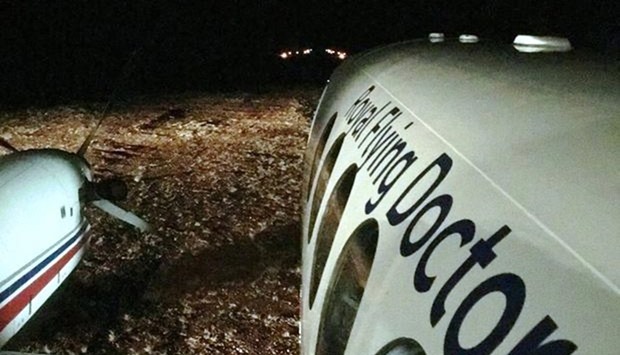It was a bizarre sight -- 20 toilet rolls set on fire and lined up in rows after being drenched in fuel.
But for pilot Geoff Cobden, it was the only way he could safely land his plane in the dark of night in a remote area of Australia to help fly a critically ill woman to the nearest hospital hundreds of kilometres away.
The flight on July 31 in northern Queensland state was a hit on Facebook when it was posted by the Royal Flying Doctor Service, and highlighted the challenges faced by their teams, who are often the only way people who work on cattle stations -- some of which are bigger than small European nations -- reach medical help.
"This particular night, we got a call that there's a patient. We discuss different ways of lighting the airstrip and we came up with dunny (toilet) rolls as the best option," Cobden, who was flying a Beechcraft King Air twin-turboprop aircraft, told AFP.
The ill farm hand had been taken to Burke and Wills Roadhouse, a service station some 250 kilometres or 30 minutes flight from where Cobden was based.
"They said 'yeah, yeah' we have plenty of dunny rolls and so we explained how to set up... so basically soak them in diesel and they'll burn for about half an hour, and set them up 30 metres wide.
"We say don't light them until we get there. We've got UHF radio so we talk to them from the aeroplane once we are overhead and get them to run along and light them all up."
Cobden said toilet rolls were a good way to light up airstrips if the cattle farms -- some of which are about 10,000 square kilometres in size -- did not have working flares. The "absolute last resort" would be using the lights from vehicles, he added.
"Generally most stations have enough toilet rolls to avert the possibility of a car-lit landing."
Cobden is based in Mount Isa, sometimes called the "oasis of the outback", with his three-person Flying Doctors team -- a doctor, nurse and a pilot -- covering an area of some 760,000 square kilometres, or bigger than France.

The flight on July 31 in Queensland was a hit on Facebook when it was posted by the Royal Flying Doctor Service.
